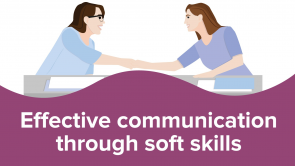International business (part 2): behaviour

Über den Vortrag
Der Vortrag „International business (part 2): behaviour“ von Michael Schmitz ist Bestandteil des Kurses „Effective communication through soft skills“. Der Vortrag ist dabei in folgende Kapitel unterteilt:
- Office rules
- Building an international network
- Networking in the office
- Networking at social events
- Formal business dinner
- Dinner: Seating
- Dinner: Ordering
- Dinner: Wine
- Dinner: Etiquette Failure
- Dinner: Conversation
- Dinner: Common Mistakes
- Dinner: Graceful exit
- Summary
Quiz zum Vortrag
In order to build an international network, you should …
- have the right mindset and regard introductions as very valuable especially in collectivistic cultures.
- have the right mindset and regard introductions as very valuable especially in individualistic cultures.
- be flexible and regard introductions as very valuable especially in individualistic cultures.
- be flexible and regard introductions as very valuable especially in collectivistic cultures.
When building your network in the office or at a party, ...
- you should be polite, respectful and optimistic. Discuss specific deals later in private.
- you should directly ask for feedback and support.
- you should try to get to know as many people as possible.
- you should drink first with the others, and then start talking to them.
What is not a respectful behaviour when invited to a business dinner?
- You are on time and await the other guests inside.
- You arrive before the fixed time, wait outside the restaurant in the summer or in the lobby during the winter.
- You move inside - but as a host, you would wait outside.
- You always arrive a bit later and move straight inside.
What should you consider when ordering at a formal business dinner?
- You should not order food like spaghetti or a soup that could spill or that is not easy to eat.
- You should not order the most expensive dish.
- You should wait for the host regarding alcohol.
- You should not order food like meat with fries or potatoes that could offend somebody.
- You should not order the cheapest dish.
Wine ...
- is overrated. Order what you want or ask for advice, but do not fall prey to false pretentiousness.
- requires a lot of knowledge and skill - never show your lack of knowledge.
- is always something you order: show your knowledge!
- and hard alcohol arrive at the same time.
What is not correct concerning small talk?
- It is bad tool to find common topics and to begin the self-disclosure game.
- It is a great tool to find common topics and to begin the self-disclosure game.
- It shows a lack of respect.
- It is ideal to learn about politics and religion.
How do you make a graceful exit at a formal business dinner?
- Wait till the others have finished eating, get up quietly and politely, thank the host for the dinner and send an e-mail with “Thank you” one or two days later.
- Wait till the others have finished eating, get up quietly and politely, thank the host for the dinner and send an e-mail with “Thank you” three or four days later.
- Wait till the others have finished eating, get up quietly and politely, thank everybody for the dinner and send an e-mail with “Thank you” three or four days later.
- Wait till the others have finished eating, get up quietly and politely, thank everybody for the dinner and send an e-mail with “Thank you” one or two days later.
Diese Kurse könnten Sie interessieren
Kundenrezensionen
5,0 von 5 Sternen
| 5 Sterne |
|
5 |
| 4 Sterne |
|
0 |
| 3 Sterne |
|
0 |
| 2 Sterne |
|
0 |
| 1 Stern |
|
0 |



